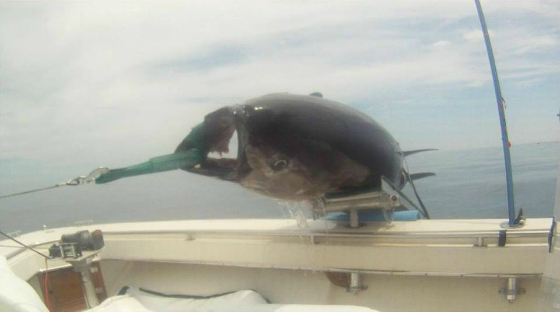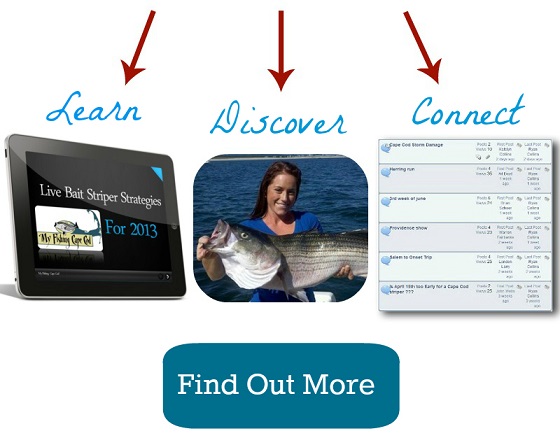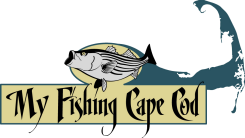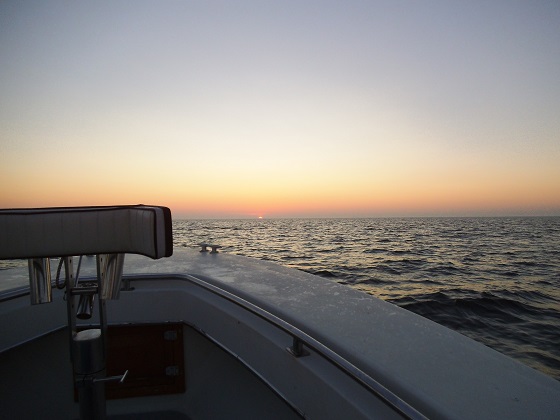Fireworks burst outside my bedroom window as I lay there, earnestly trying to catch some sleep. My alarm was set for 12:45AM, a rather inconvenient wake up time, considering all the July Fourth weekend activities that take place on Cape Cod. It was already 11:30PM so I was looking at maybe an hour of sleep, if I was lucky.
But forgoing the fires and fireworks for a chance at a giant bluefin tuna was, in my mind, worth it. The wind had finally calmed down and the leaves on the trees outside my window barely rustled at all. Mother Nature had granted a weather window of opportunity, so I felt obliged to give it a go.
Before I knew it my alarm rang and it was time to go catch some fish.
Step One | Catch Pogies for Bait
Arriving at the tuna grounds without any live bait in the tank is never the most desirable of situations. Often times you can jig up whiting, mackerel or sea herring but it's never a guarantee. If possible, I think it's best to have at least a few live baits already on board.
Thus step one was to find and catch live pogies. The tide was towards the lower end of the spectrum, which both Mazzola and I felt would provide us with a better chance of catching menhaden, contrasted to a high tide. With the exception of one hardy, and somewhat "tipsy" soul, the boat ramp was empty. We were going to have and enjoy plenty of open space to set and retrieve the gill net.
The time was 2AM and the sky was pitch black, with a sliver of a crescent moon struggling to rise above the horizon. The stars were out in full force, and if you looked closely you could see satellites streaking across the night sky. Every so often a meteor would enter Earth's atmosphere, burn up and illuminate the air above our heads.
Mazzola eased his boat into position as I began to drop the gill net overboard. I watched as the orange buoys floated off behind the stern and vanished into the darkness. Soon the entire net was set and we began to drift, pushed lazily along by a light current and a touch of wind.
Every so often I would shine a quick burst of light out onto the buoys to see if any were bouncing up and down, indicative of a pogie catch. Yet after 25 minutes we began to realize that our chosen spot did not contain any pogie life at all. It was time to retrieve the net and motor off to a new area.
Fortunately after a half an hour ride spent searching around and setting the gill net in various areas, we were able to zone in on the pogie schools.
Mazzola placed our final pogie into the live well with forty minutes to go before sunrise. Finally tally was around two dozen live pogies which would be more than sufficient, granted we did not encounter bluefish, striped bass or sharks at the tuna grounds. It felt good to know that we would be able to immediately start tuna fishing, and not have to waste time catching bait, upon our arrival.
Once on the ocean we were greeted by a slight chop and a picture perfect Cape Cod sunrise. The air was oddly cool but still somewhat sticky. I had a feeling we were in for another scorcher of a day, so I was sure to enjoy this fleeting moment of coolness before the sun climbed higher in the sky.
Upon arrival we began marking bait on the sonar and a medium size pilot whale surfaced off the starboard side. I readied the anchor as Mazzola positioned the boat in a spot that has been very tuna-friendly to us in the past. Soon we were anchored up and ready to place a bait in the water.
The pogies were alive and frisky, pumping in circles around the bait well. The 25 mile per hour run did not seem to adversely affect them, aside from a few which had suffered mortal injuries while stuck in the gill net.
I reached into the tank with my bare hand and attempted to grab one of the feisty fish. They maneuvered all around my hand with surprising agility. It took a couple tries but I was eventually able to wrap my fingers around one particular pogie I believed would look very good on the hook.
The ever so slight of a breeze we had enjoyed on the ride out was beginning to back off, and the seas began to further flatten out. I watched as one of our pogies aggressively pulled a balloon in an eastward direction, heading down current and away from the boat. I wondered if there were any larger animals already in the vicinity, watching the pogie and deciding whether or not to make a move on the bait.
With the baits set both Mazzola and I took a moment to sit down, which we had not done since the ride to the boat ramp. We had schools of bait beneath the hull of our boat, whales all around us and live pogies swimming vigorously on our hooks.
The stage was set to catch a Cape Cod giant bluefin tuna.






